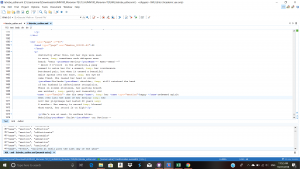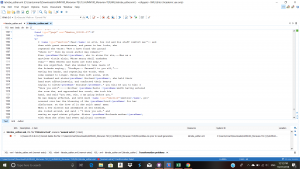Over the last two weeks, the Latrobe reading was a reading were one had consider at a micro level how an author expresses herself using specific terms, descriptions of people and places, and observations about his/her experiences, in which mostly it was just her telling us how very ill she was during her whole life time. Overall, this process of this transcription was a unique one for sure, However, even though it was a way to bring the story into a transcription online there are things that represented on the transcription itself. Has Elena Pierazzo explains, “obviously a transcription cannot exactly reproduce the relative precision or carelessness with which handwritten letters are formed, or their relative sizes, or the amount of space between words and lines.” (465) Not everything can be captured in this transcription.
The process of marking up the transcription that I made affected my understanding of the text in many levels into understanding it how one would analyze the text. Because there are many things to consider in the sense in what we categorize as what. For example “God” or “Lord,” these words can have different meanings to it because many people have different opinions on this subject. Is “God or Lord” a human being, is it a thing or is it an idea for many people. There are so many ideas that one has to contemplate to mark it.
 The process of collaborating as an editorial board with my group also changed my understanding of how edited texts are produced. When collaborating with my group one had to keep in mind in we needed to do as a whole. “Decisions about what one should encode and should not encode are to be determined according the purpose of our encoding.” (469) The meaning I took from this is that as a collective group we needed to come to an understanding in what we encode in the transcription. As I said before each human as a different idea in what word means to them. A personal example can be the word “emotion.” “Can “emotion” have emotion?” was the question I had to my group. When talking about it, we tried resolve the issue by trying to understand the context in when the word was used and then we will have a majority vote in what it was. Also, we had help from other people in class in what they thought in our project. As Elena speaks, “From the editors’ interpretation of the text and of the author(s) intentions it is necessary now to consider the readers of the edition and ask what must be added to the edition itself to satisfy their needs and expectations. ” Having the the opinions that are not from our group is essential to have because even as a group we can mistakes as a whole in our Transcription.
The process of collaborating as an editorial board with my group also changed my understanding of how edited texts are produced. When collaborating with my group one had to keep in mind in we needed to do as a whole. “Decisions about what one should encode and should not encode are to be determined according the purpose of our encoding.” (469) The meaning I took from this is that as a collective group we needed to come to an understanding in what we encode in the transcription. As I said before each human as a different idea in what word means to them. A personal example can be the word “emotion.” “Can “emotion” have emotion?” was the question I had to my group. When talking about it, we tried resolve the issue by trying to understand the context in when the word was used and then we will have a majority vote in what it was. Also, we had help from other people in class in what they thought in our project. As Elena speaks, “From the editors’ interpretation of the text and of the author(s) intentions it is necessary now to consider the readers of the edition and ask what must be added to the edition itself to satisfy their needs and expectations. ” Having the the opinions that are not from our group is essential to have because even as a group we can mistakes as a whole in our Transcription.
Mauricio Enrique Martínez is a student who is majoring in Cultural Anthropology and Japanese at Bucknell University. A wanderer in life.